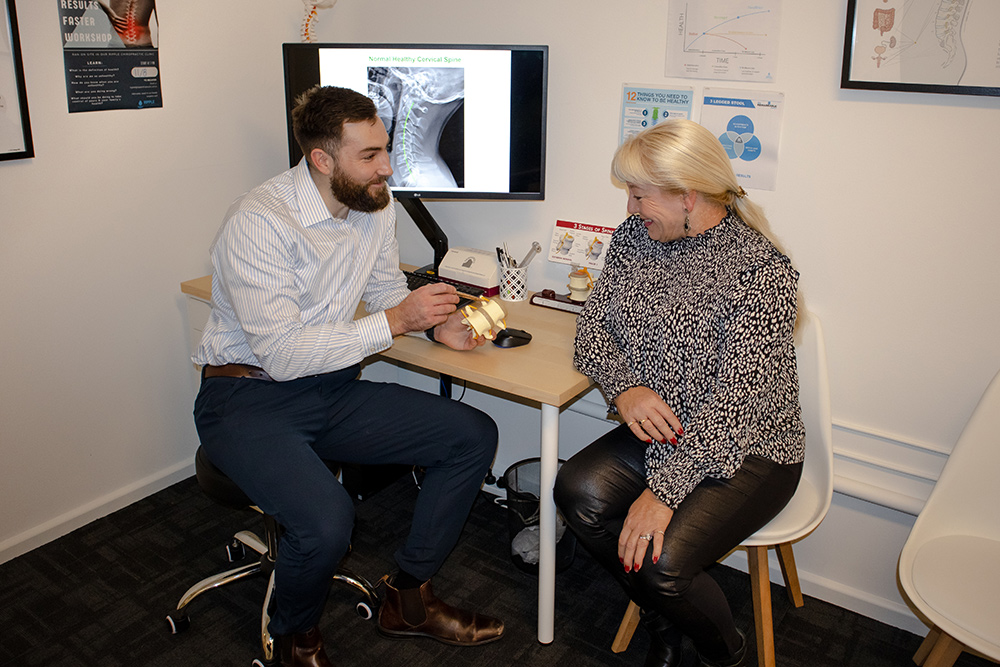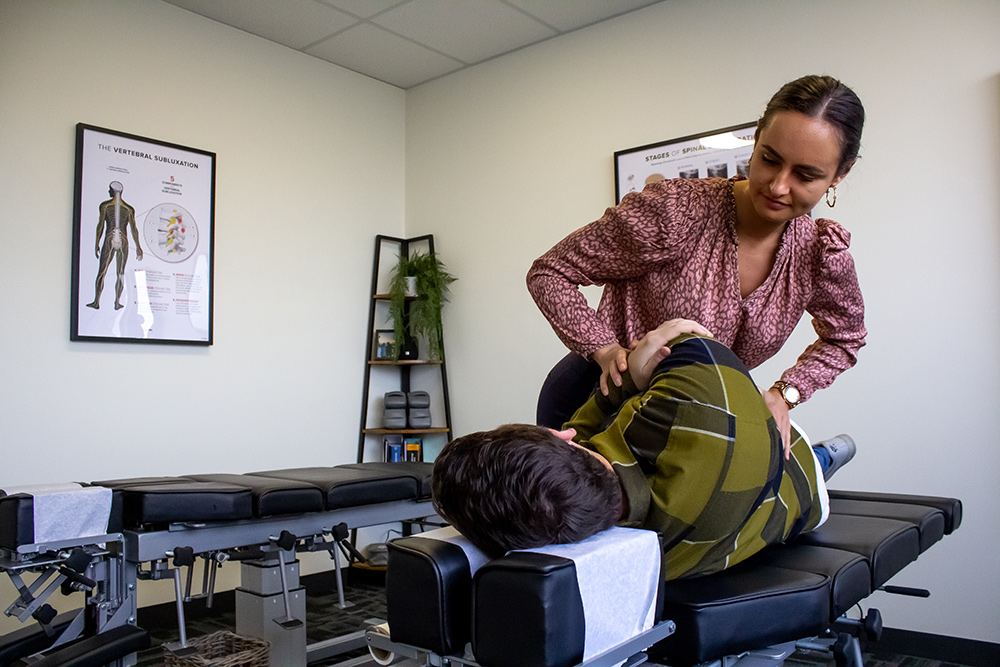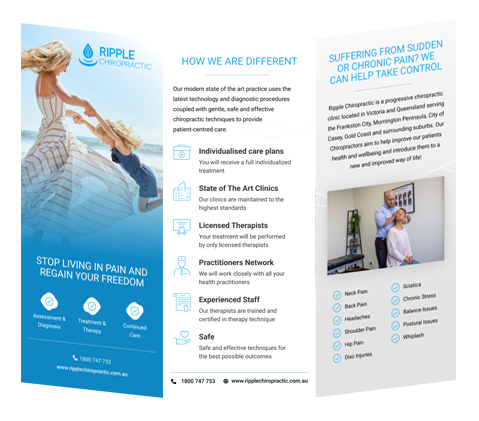Does Chiropractic Help Bulging and Herniated Discs
Last updated on May 13, 2024
Suffering from a bulging or herniated disc can bring about significant pain and discomfort, prompting many to wonder if chiropractic care could be the solution. So, does chiropractic help bulging discs and herniated discs?
Read on to uncover insights into these conditions, including their symptoms and causes, and learn how chiropractic treatments can provide pain relief.
Table of Contents
ToggleWhat are Intervertebral Discs?
Intervertebral discs have a tough outer cartilage with a softer interior. They act as your spine’s shock absorbers, ensuring that your vertebrae do not rub against each other.
However, these discs can wear out or become damaged, leading to stiffness, disc pain, or reduced mobility.
What is the Difference Between a Bulging Disc and a Herniated Disc?
Though often used interchangeably, bulging and herniated discs have distinct differences:
- Bulging Disc: A bulging disc occurs when a disc stretches beyond its standard perimeter, often affecting a significant part of the disc. Considered a normal part of the ageing process, bulging discs may not always lead to discomfort.
- Herniated Disc: Also known as a slipped disc, a herniated disc involves a crack in the disc’s outer layer (annulus), allowing the inner gel-like material (nucleus) to protrude. This can lead to significantly more painful symptoms if the disc material compresses a nearby spinal nerve.

A bulging disc can occur due to age-related disc degeneration or stress on the spinal column.
What Causes a Bulging Disc and What are Its Symptoms?
A bulging disc occurs due to age-related disc degeneration or stress on the spinal column. They can also be caused by poor posture, obesity and underlying medical conditions such as arthritis.
Unlike herniated discs, symptoms might not be as evident unless the bulge compresses nerve roots.
When symptoms do present for bulging discs, they can include:
- Aching or stiffness in the affected area
- Radiating pain through the buttocks, thigh, calf, or foot
- Numbness or tingling in the legs or feet
What Causes Disc Herniation and What are Its Symptoms?
Herniated discs can result from gradual wear and tear or sudden injury. Factors such as genetics, occupation and lifestyle can influence susceptibility. Symptoms often include:
- A sharp, localised pain
- Numbness or tingling in extremities
- Muscle weakness
Is Chiropractic Good for a Bulging Disc?
For those wondering, “Is chiropractic good for a disc bulge?” It can certainly be an effective treatment for managing symptoms associated with a bulging disc, as chiropractors can help reduce the bulge, address pain, and improve spinal mobility.
This can be done through techniques such as:
- Spinal adjustments: Hands-on manipulation to realign the affected disc and relieve pressure on surrounding spinal nerves.
- Spinal decompression therapy: This involves using a motorised device to gently stretch the spine and create negative pressure to draw the bulging disc back.
- Soft tissue therapy: Massage therapy or other techniques to relieve muscle tension and improve overall circulation.

Chiropractic treatments can help to decrease inflammation, relieve nerve compression and enhance spinal function.
Is Chiropractic Good for a Herniated Disc?
Chiropractic treatments, including adjustments and mobilisation, can decrease inflammation, relieve nerve compression and enhance spinal function.
Similar to bulging discs, chiropractic treatment such as spinal adjustments, spinal decompression therapy and soft tissue therapy can also assist with a herniated disc.
However, practitioners must conduct thorough assessments before proceeding, ensuring that chiropractic care is suited to the individual’s specific condition. Depending on where the slipped disc has occurred, the individual may require surgery.
What to Expect During a Chiropractic Appointment
Understanding what to expect during an appointment can ease any apprehensions for those considering chiropractic care for bulging or herniated discs. Here is a general overview:
- Medical History and Examination: The Chiropractor will gather your medical history and perform a comprehensive physical exam. This includes evaluating your posture and range of motion and pinpointing any areas of disc pain or discomfort.
- Diagnostic Tests: Depending on your symptoms and examination results, further diagnostic tests like X-rays or MRI scans may be recommended to gain a clearer understanding of your spinal health.
- Personalised Treatment Plan: The Chiropractor will then craft a personalised treatment plan, taking into account your individual needs and health goals. This plan might encompass a series of chiropractic adjustments aimed at alleviating symptoms.
- Additional Recommendations: Beyond adjustments, your treatment plan may also include exercises, stretches and lifestyle advice to support your recovery and prevent future issues.
- Communication: Throughout the process, your chiropractor will explain each step, ensuring you are fully informed and comfortable with the proposed treatment.
Tips for Preventing a Bulging or Herniated Disc
Prevention is key to avoiding the discomfort associated with a herniated or bulging disc. Here are several strategies to protect your spine.
- Maintain proper posture: Keep your spine properly aligned, especially when sitting for long periods. Ergonomic furniture and frequent posture checks can be helpful.
- Regular exercise: Engage in activities that strengthen your core muscles. Include both flexibility and strengthening exercises in your routine.
- Healthy weight: Strive to maintain a healthy weight to reduce the burden on your spinal cord.
- Lift properly: Proper lifting techniques are vital to avoid injury. Remember to use your legs rather than your back and avoid twisting your spine while holding heavy objects.
- Stay hydrated: Keeping hydrated helps maintain the elasticity and flexibility of the discs in your spine.
- Take a break: If your lifestyle or job involves prolonged periods of sitting or standing, take regular breaks to stretch and move around.
Embracing Chiropractic Care for a Bulging or Herniated Disc
Chiropractic treatment provides a multifaceted approach to alleviate pain, improve mobility and encourage the body’s natural healing process.
Does chiropractic help bulging discs? It can certainly be a valuable component of a comprehensive approach to managing pain and it is essential to always consult with a professional Chiropractor to formulate the best treatment options for your needs.
How to Schedule an Appointment
If you’d like to book an initial consultation, call us on 1800 747 753 or fill out our online booking form.
FAQs
If you have any more questions about whether chiropractic helps with bulging or herniated discs, please don’t hesitate to contact us today. In the meantime, check out our most frequently asked questions below which may provide additional information you’re looking for.
How quickly can I expect relief from disc-related back pain with chiropractic care?
The speed at which you will experience relief can significantly vary as it is influenced by the specific nature and severity of your condition and your body’s response to the treatment. While many patients report feeling noticeable improvement within just a few sessions, the overall treatment plan may span several weeks to months.
Are there any risks associated with chiropractic treatment for a herniated or bulging disc?
Chiropractic care is widely regarded as safe for treating disc-related issues; however, as with any medical treatment, there are inherent risks. It is important to seek care from a Chiropractor who is experienced in treating disc conditions and diligent in conducting thorough assessments.
Does chiropractic treatment cure a herniated or bulging disc?
While chiropractic care effectively manages the symptoms associated with bulging or herniated discs, it is not typically considered a cure for structural disc damage. It is part of a holistic approach that may include lifestyle adjustments, physical therapy and other treatments.
General Information Disclaimer: The content provided here is for informational purposes only and is not intended as medical advice, diagnosis, or treatment. Always seek the advice of your health professional with any questions you may have regarding a medical condition. The information on this site is general in nature and may not reflect current medical developments or research. Your reliance on any information provided by this site is solely at your own risk



